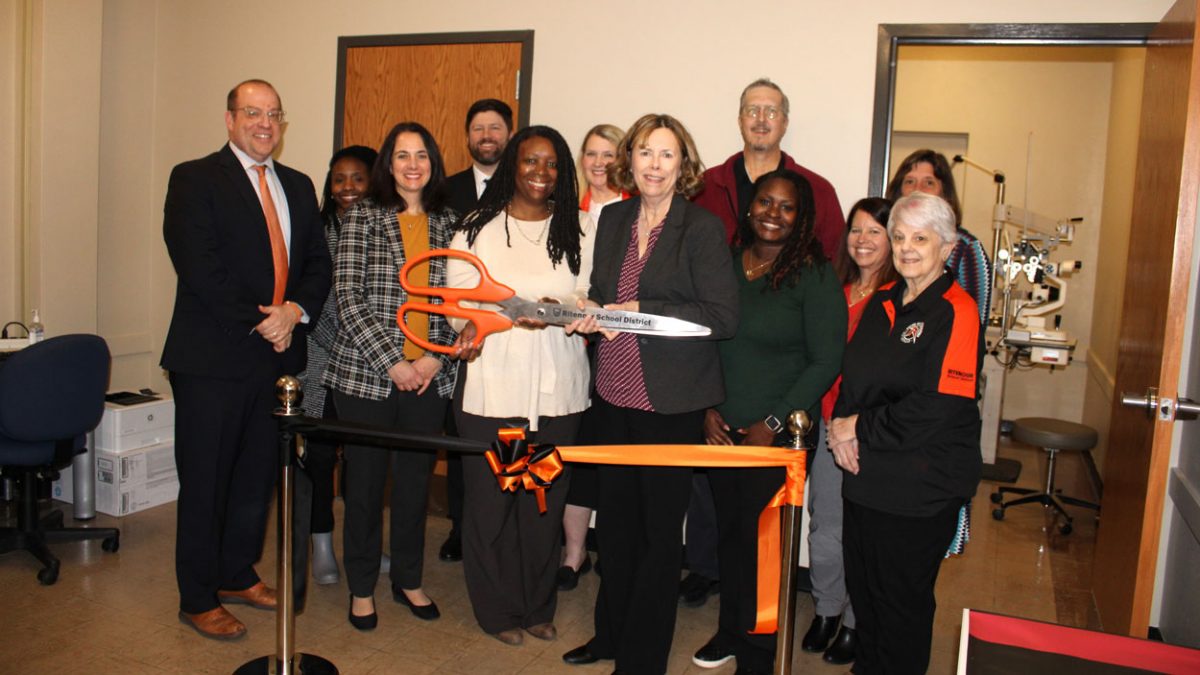
College of Optometry Dean Keshia Elder and Associate Dean of Clinical Operationss Dr. Vinita Henry (center) pose with Ritenour School District Superintendent Chris Kilbride, Dr. Julie DeKinder, Dr. Patrick Stark, members of the Ritenour school board and other administrators at a ribbon cutting in the Husky Health Center in early February. (Photo courtesy of Husky Health Center)
During classes in the College of Optometry at the University of Missouri–St. Louis, third-year student Kiley Stout has reviewed studies showing that 80 percent of learning is visual. She and her fellow students have learned the impact that uncorrected vision problems can have on reading, writing and classroom participation, ultimately affecting a student’s academic success and development.
Earlier this semester, Stout witnessed the role that eye care plays in learning firsthand as one of several third-year optometry students to provide eye examinations at the Ritenour School District’s Husky Health Center. The Husky Health Center, which the school district opened in a former church last fall, allows students to access little-to-no-cost medical care and behavioral health services during school hours, and UMSL students are now providing eye exams to Ritenour students as part of a new partnership.
“Seeing this firsthand reinforced my belief that optometry plays a key role in a child’s success and strengthened my commitment to making eye care accessible, community-focused and impactful,” Stout said. “For me, vision care is more than a profession; it’s a commitment to empowering communities through sight and compassion. Being part of a school-based health initiative gave me a deeper appreciation for early detection and intervention – many of these students wouldn’t have received an eye exam otherwise. Seeing firsthand how correcting vision can improve a child’s ability to learn and engage in school motivates me to advocate for increased access to pediatric eye care in my future career.”
The partnership between UMSL and the Husky Health Center has been in the works since last fall, and UMSL students officially began seeing patients in early January. Dr. Vinita Henry, the current associate dean of clinical operations and a clinical professor, said the college had specifically been looking for opportunities for students to work with pediatric patients. When Associate Dean of Academic Programs Dr. Julie DeKinder spoke with the Ritenour superintendent at an event last year and learned that the Husky Health Center didn’t yet offer vision care, the collaboration was born.
Ritenour School District Superintendent Chris Kilbride said the addition of UMSL’s Optometry Center is an important service that sets up Ritenour students for success.
“We are thrilled that the UMSL Optometry Center is partnering with us and the Husky Health Center to remove another barrier that prevents some of our students from experiencing success,” Kilbride said. “Providing comprehensive vision care at no cost or low cost will be a game-changer for students. When students can see clearly, they can fully engage in their education, gain confidence and reach their full potential.”
Within the Husky Health Center, the College of Optometry has its own dedicated office and two fully equipped exam lanes. Each week, third-year students provide comprehensive eye exams to Ritenour students ranging in age from pre-K to 12th grade, including a vision assessment with refraction to determine if glasses are needed, ocular functional testing to evaluate how the eyes work together and an ocular health evaluation via dilation to check for any underlying eye conditions. Students who need glasses have their measurements taken, choose from a selection of frames and then pick them up their glasses from the school nurse when they’re ready.
“One of my biggest takeaways from this experience is seeing how critical school-based health centers are in bridging health care gaps for children,” Stout said. “Many families face significant barriers to accessing regular eye care, including financial constraints, transportation challenges, limited awareness about vision health, long wait times and provider shortages. At Husky Health Center, these obstacles are removed by providing essential medical services during school hours, including comprehensive eye exams, glasses and referrals, regardless of a family’s ability to pay.”
For now, each UMSL student is spending just one full day working in the Husky Health Center, but the experience has still left a lasting mark. Students have noted that working in the Husky Health Center gave them more experience with pediatric exams and the eye conditions that go along with them and allowed them to further develop their pediatric clinical and medical decision-making skills.
Larry Kosmerick, another third-year Optometry student, saw several patients during his time at Husky Health Center, including one who was still having trouble seeing after getting new glasses a few months earlier from a separate source. He found the patient had significant strabismus (eye turn) but also had glasses that were made incorrectly and had switched the prescriptions for her right and left eye. Kosmerick was able to get her fitted for a new pair of glasses with the correct prescription, and the Husky Health Center will continue to follow up with her to see if her vision improves. He said it was particularly valuable to earn more experience with pediatric patients.
“We could encounter anything from binocular vision anomalies that affect school performance or address health concerns that may have gone undetected if the child had no previous eye exam,” Kosmerick said. “Pediatric exams are unique in the fact they can be a mixed bag, where you have to be attentive yet play into who you’re helping as well. A 6-year-old patient can’t do the things a 26-year-old can. So, we also learn a lot to provide a more specialized care for kids and other special populations.
“The most impactful takeaway I received, as a future optometrist, is the health care model presented by Husky Health invests in community wellbeing and fosters an environment where children can thrive academically and in life.”














